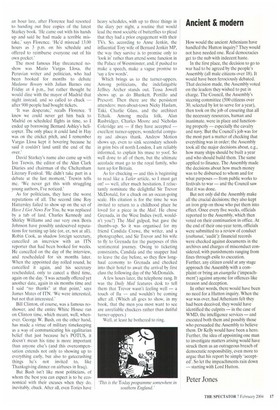Ancient & modern
How would the ancient Athenians have handled the Hutton inquiry? They would not have needed one, Real democracies get to the nub with indecent haste.
In the first place, the decision to go to war had to be agreed by the people's Assembly (all male citizens over 18). It would have been ferociously debated. That decision made, the Assembly voted on the leaders they wished to put in charge. The Council, the Assembly's steering committee (500 citizens over 30, selected by lot to serve for a year), then took on the job of ensuring that all the necessary resources, human and inanimate, were in place and functioning properly — especially the cavalry and navy. But the Council's job was for the most part a matter of checking that everything was in order; the Assembly took all the major decisions about, e.g., how many ships should be built a year and who should build them. The same applied to finance. The Assembly made the decisions about how much money was to be disbursed to whom and for what purposes — from public works to festivals to war — and the Council saw that it was done.
But not only did the Assembly make all the crucial decisions; they also kept an iron grip on those who put them into effect. Once every five weeks, officials reported to the Assembly, which then voted on their continuation in office. At the end of their one-year term, officials were submitted to a review of conduct (euthunai, 'audit'): financial records were checked against documents in the archives and charges of misconduct considered, with punishments ranging from fines through exile to execution. Further, any citizen could at any stage approach the Assembly with a complaint or bring an eisangelia ('impeachment') against anyone for offences like treason and deception.
In other words, there would have been no need for a Hutton inquiry. When the war was over, had Athenians felt they had been deceived, they would have identified the culprits — in the case of WMD, the intelligence services — and executed both them and possibly those who persuaded the Assembly to believe them. Dr Kelly would have been a hero. Further, the idea of appointing one man to investigate matters arising would have struck them as an outrageous breach of democratic responsibility, even more to argue that his report be simply 'accepted'. So let the impeachments rain down — starting with Lord Hutton.
Peter Jones


























































 Previous page
Previous page